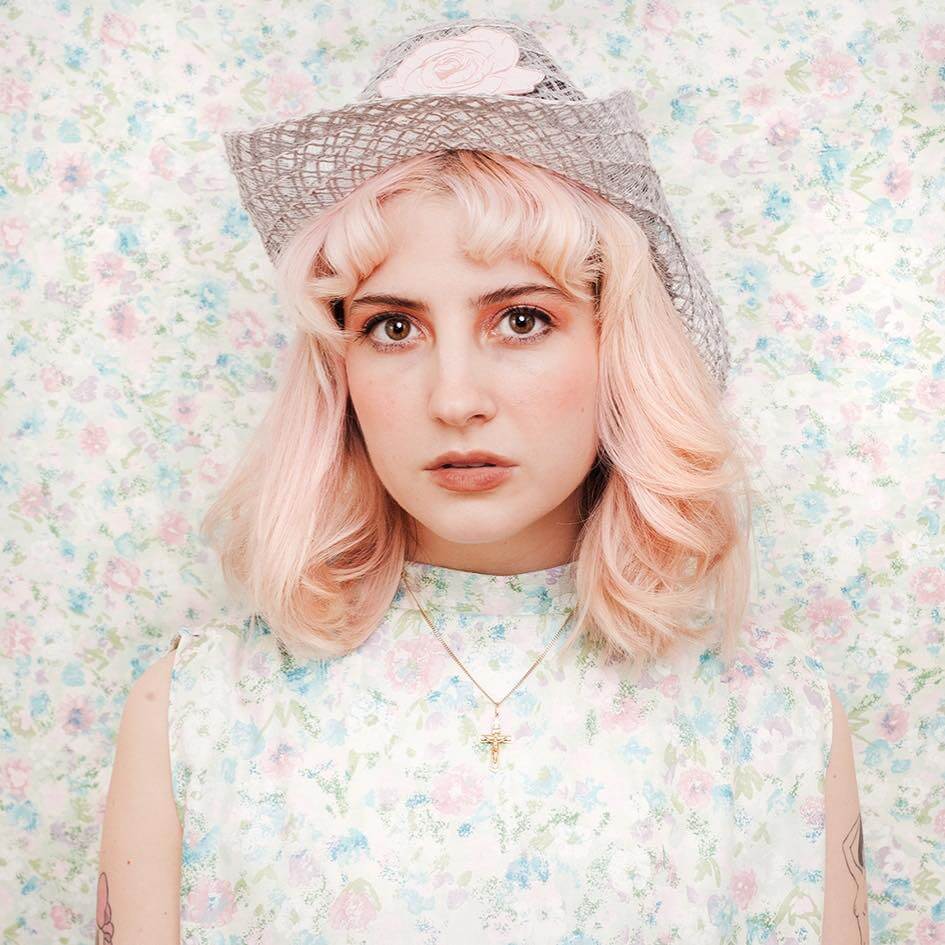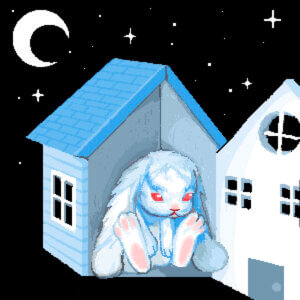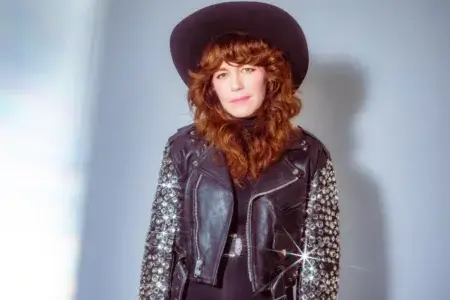PONY Finds Power in TV Baby

PONY singer-guitarist Sam Bielanski is in the midst of producing high-grade pop-rock at a prolific clip. While the Toronto-area band’s debut full-length, TV Baby, sees release April 9 through Take This to Heart, the neon bubblegrunge bounce of “Chokecherry” and “By the Way” are actually several dozen songs back in Bielalski’s ever-growing catalogue. You can thank the 2 Much TV podcast Bielanski co-hosts with collaborator Pretty Matty (they play in each other’s bands) for the semi-recent surge
Since the start of the pandemic, the weekly podcast showcases songs written by each host that are based on TV episodes pulled from The Ringer’s 100 Best Shows of the Century. Some are on-the-nose, like Bielanski running lines from an episode of The Walking Dead atop a few chords. Another week, an organ-saturated song about the game of life alludes to the spinning wheel framework of the Price is Right.
While the podcast partially exists as a project for Bielanski and Pretty Matty to sharpen their writing chops, the pair also use 2 Much TV to consider the past 20 years of pop culture, and how it may have shaped them—it’s not always for the better. One episode, for instance, had the hosts re-contextualizing the emo misogyny of The O.C. protagonist Seth Cohen—if not the toxic drama of many TV couplings—and realizing that some archetypes are better left in the past.
On the bright side, some fictional figures still hold up. While not on the Ringer’s list—and, you know, technically a movie—Bielanski tells Northern Transmissions about the impact of seeing a TV commercial for 2001 comedy Josie and the Pussycats, and how it helped kickstart the PONY leader’s own musical ambitions. Even if the Archie Comics character didn’t exist IRL, the ideas she represented resonated with Bielanski for years to come.
“I didn’t really listen to a lot of guitar music growing up; I mostly listened to pop music because that was definitely marketed towards little girls,” Bielanski says, coincidentally on the eve of the Josie soundtrack’s 20 th anniversary. “This was my first true introduction to guitar music, this movie, and being able to see it was so important. To see this girl [and think], ‘Oh my god, I want to be like her when I grow up,’ was so influential. I didn’t realize until a couple of years ago that my songwriting style is so influenced by that movie.”
Shortly after wrapping up a podcast episode with Supercrush’s Mark Palm around an episode of Better Call Saul, Bielanksi got into the connective tissue between PONY’s music and the 2 Much TV podcast, the everlasting impact of Josie McCoy, and what it means to be a TV Baby.
This interview has been edited and condensed.
Northern Transmissions: How in the bag was TV Baby before you started the 2 Much TV Podcast?
SAM Bielanski: It was finished. We had a long journey with the record where we recorded it and then weren’t happy, so we went back in the studio to record again. We were getting ready to go to SXSW to quite literally shop the record around, and then the pandemic hit. I was basically like, “Oh cool, so the record will probably never come out. That’s ok….let’s do this podcast instead!” [But then] Joe [Urban], the label manager at Take This to Heart, reached out and said he wanted to put the record out. I feel like the podcast and the record are sisters, in a way.
NT: Having now added this weekly, in-depth podcast project to your schedule, has the idea of being a “TV Baby” changed for you at all?
S: It hasn’t really changed. A lot of people [think] ‘You must watch way more TV now, because you’re doing this podcast,” but I really only watch one more episode a week than I had been before. TV has just always been so comforting to me— even just putting on House Hunters or something that can just [feel] like company. My whole life, I’ve had this connection where I enjoy TV’s company so much. It feels like being wrapped up in a warm blanket, or something.
NT: Has that sensation been heightened at all because of the pandemic?
S: Totally. I think I’m more sensitive now than I had been in the past. I cry a lot more these days. Not even in like a sad way, I’m just sensitive to things I see on TV. I’ll cry at anything. I’ll watch Queer eye for the Straight Guy and start crying the moment the music starts. That has definitely been heightened through the pandemic [so] I find myself leaning towards watching things that are just super uplifting. I’ll watch a lot of RuPaul’s Drag Race, even if I’ve seen the season three or four times. These queens are my best friends: so strong, confident, and sassy. There’s probably very little that’s going to happen in this episode that will trigger me to cry in any way—unless it’s tears of joy.
NT: With that sensitivity and heightened awareness in mind, can we get into the record’s “Web MD?” The lyrics are a zeitgeist kind of experience, especially this year: Anxieties and health paranoia around COVID-19, Googling symptoms online…
S: It’s so funny that this was the first single we chose to release, because I wrote that song probably a year-and-a-half before the Coronavirus happened. I always think that I’m dying. Even my partner will be like, “don’t Google it up; go to the doctor,” but I’ll be dramatic about it, like, “No, I can’t. I’m just going to die.”
That song is about that aspect of myself, being really anxious and self-diagnosing myself. But I would rather pretend to have this fake illness, or have these symptoms, than subject myself to hanging out with people who are probably bad for me, people who want to take advantage of me.
NT: So you’d spent some serious time with these TV Baby songs, having re-recorded them. In light of this other project, the 2 Much TV podcast where you’re writing and releasing songs weekly, has your approach to songwriting changed at all?
S: Honestly, I’ve been using the podcast as a way to figure out new ways to write music. Before the podcast, writing music was an experience where I’d be like, “Ok, what kind of trauma am I going to trudge through today?” I would draw from my own personal experience. With the podcast, we’re writing with a prompt; we’re writing about the episode. It’s opened my eyes to this new way of songwriting that can still be very personal, but doesn’t have to be so traumatizing. I think that with a lot of the songs on the podcast that I’ve written, if I’d put in a little more care in developing them they could definitely be PONY songs. But sometimes a PONY song will come together in 20 minutes.
NT: There’s something nice about having those parameters on the podcast songs, though, and coming to terms with a song that might not have turned out the way you wanted. It’s Ok if they’re not perfect. I think you’d brought that up for the Spongebob and Rick & Morty songs, in particular.
S: When you’re working with a time limit, sometimes you just have to say “Ok, this is the song this week. I wrote it, and it’s done….but it’s definitely not my best work.” It’s an interesting thing, too, because I’m sure lots of people who make a ten-song album probably have 10-15 other songs that were trash that they had to write in order to get to those ten great songs.
NT: What have you learned about your own stylistic go-tos and musical shorthand? In the Arrested Development episode, you put out the idea that you might have had plagiarized yourself.
S: Sometimes I’ll get halfway through a song and think the melody sounds so familiar, and then I’ll realize I copied the melody from five episodes ago. It happens!
NT: You’ve mentioned that the music from the Josie and the Pussycats movie was an inspiration, and even on Instagram you’d posted a bedroom cover of “I Wish You Well.” It’s a wildly underrated pop-punk record, so what can you say about the impact that the movie had on you?
S: I listened to that record today; I have it on vinyl. I saw that movie when it came out in theatres on the first day! I saw the commercials and thought, “Oh my gosh, that girl, Josie, looks like me! She’s playing guitar; she’s dressed so cool!” I was probably nine when that movie came out; I was quite small. It was the first time that I had seen a woman playing guitar, and talking about writing her own songs. It truly changed my life. I went as Josie for Halloween that year. I knew every word to every song. I had the movie on VHS and DVD.
I didn’t really listen to a lot of guitar music growing up; I mostly listened to pop music because that was definitely marketed towards little girls. My parents would buy me all the Britney Spears and Spice Girls CDs. This was my first true introduction to guitar music, this movie, and being able to see it was so important. To see this girl [and think], “Oh my god, I want to be like her when I grow up,” was so influential. I didn’t realize until a couple of years ago that my songwriting style is so influenced by that movie.
NT: How soon after that moment did you start playing guitar?
S: It was a long while. My dad always wanted me to play guitar, but I was bored of lessons [and] I wasn’t a good student. I didn’t really start playing guitar until I was in my late teens, [after] I had gotten an acoustic guitar as a gift. I was like, “This is cool! I can write my own songs now.” I was a late bloomer, in terms of learning how to play an instrument. Even now, I’m not a very good guitar player. I mostly use guitar as a vehicle to write songs.
NT: Why hadn’t you been happy with the original recordings for TV Baby
S: We had a pretty rough experience in the studio. Someone who had been producing the record pretty much jumped ship after we paid them. It was a nightmare. We kept getting the record mixed, but it was not sounding great. At this point we’d been playing the songs live for six months, so they had already changed so much from the recording. We were learning different ways to play parts, and different ways to sing them. I’d felt that the songs had evolved so much, and maybe we didn’t quite capture it as well as we could have. So we went into the studio to work with Josh Korody. We didn’t re-record everything, but we did re-record most of the vocals…we added more guitar. Way more harmonies.
NT: What would be the song that went through the most changes?
S: “Sometime Later” definitely went through the most, because I rewrote the lyrics and melody to the song. We were listening to it in the van and I was, like, “Ew.” It’s like you’re reading your diary over and over again, in front of people. That’s kind of a cringe moment, so what can we do to make it less cringe?
NT: Overall, is TV Baby less cringe that it could’ve been?
S: I’m so sensitive to my own cringe that if I make something, I generally can’t listen to it. But I’ve listened to TV Baby several times recently. I’ll start listening to it while I’m sitting down, but then I’ll stand up and pace around, like, “This is so good, I just want to dance right now.”
NT: Now that you’ve made part of your life literally episodic, should people listen to the pod in order to get the arc of the relationship you and Matty have with these TV shows?
S: I think that the cool thing about the podcast is that you can really curate your own experience; I don’t think you have to go chronologically. My sister was not a fan of the podcast for a long time, and I think it was because she was unfamiliar with a lot of the episodes we were [covering]. As soon as we did an episode of something she liked, she thought it was cool. Now she’s caught up! You can listen to it based on a guest you may like, or around a show that you like. Pick and choose!
NT: As you’re going through these shows that are, in some cases, 20 years old, it’s possible to track these generational swings on how we interpret fictional characters. This is something that has come up in the podcast through discussions of shows like The O.C. and Arrested Development—characters like Seth Cohen aren’t seen quite as sympathetically by modern audiences than what they’d arguably been made out to be when those episodes first aired 20 years ago. Have your ideas on past favourite characters been forever changed by this project?
S: Absolutely. I used to have a poster of Seth Cohen in my bedroom. I wanted to marry Seth Cohen! We actually re-watched The O.C. about a year before the podcast [and] I wanted to punch this guy. He needed to get his ass kicked. He’s horrible! It makes me so mad. Things make sense— now that I’m an adult watching this— as to why I was such a dumb teenager, because I see these relationships on TV where I’m like, “I guess it’s just normal for your boyfriend to gaslight you. It’s normal for your boyfriend to cheat on you.” But he was definitely painted as the underdog, the quiet hero of the show. Things have changed. Also, Pam and Jim [from the Office]. I used to be like, “What a love story!” Now it’s like, “Maybe you guys aren’t that good for each other. Your relationship seems truly difficult.”
NT: As you mentioned, TV Baby has gone through some significant shifts. Somewhat following up on a few questions, here, but is there a chance—or worry— that, 20 years down the line, TV Baby could actually be seen as cringe, after all?
S: That is a loaded question. I don’t think so, and I’ll tell you why. TV Baby is about finding power and finding independence—the beauty of being alone, even though you [still] have company in the television. I’m sure [TV] will exist in 20 years. I sure hope so. But even if it doesn’t, people finding the power in being independent will never be bad; it’s empowering. I hope that 20 years from now someone will listen to this and be like, “whoa, I feel the way this person feels too.”
Latest Reviews
Tracks
Advertisement
Looking for something new to listen to?
Sign up to our all-new newsletter for top-notch reviews, news, videos and playlists.









